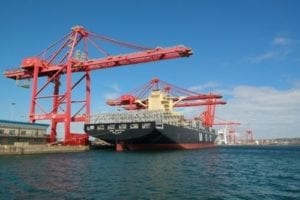With infrastructure spend in the sub-Saharan region estimated to reach $180 billion per annum by 2025, integrated infrastructure planning and development remains key to the region’s growth.
“Integrated Planning and Infrastructure Development – How to make this a Reality” is the subject of a panel discussion at the SAAFF Congress taking place at the Durban International Convention Centre from 14 to 16 October. Among the challenges, says panellist Kevin Martin, chairman of the Harbour Carriers Association, are mindsets. “Infrastructure needs to be examined with an open mind, out-the-box thinking.” Referring to the Gauteng toll roads and the proposed tolls in the Cape (N3) and N2 in Transkei as examples of projects that had not been approached with an open mind, Martin says: “Harbour and land usage needs to be examined particularly at the operational level at terminals. Design and layout must be re-jigged. If this is done correctly, we can become the ‘Rotterdam of sub-Saharan Africa”. Martin points out some of the challenges at the Port of Durban. “The simple fact is that in Durban we are spending money but not improving productivity in the right areas. We are experiencing huge truck delays, ships running aground, a decline in pilot chopper utilisation etc.,” he comments. Martin says the requirement for infrastructure development is widespread. “All areas need attention. Our ports need to be correctly designed and operated, and road usage optimised to take the best out of the ‘new’ port plan and design. Rail is also part of the intermodal structure. We need to stabilise pricing and become truly intermodal, including public-private partnerships for interchange zones.”Martin says skills would have to be prioritised before investment could come on board. “If your plan is good, and the market has bought into the plan due to a participatory planning process, investment is basically a given. In short, stop putting the cart before the horse – because customers will have no faith in that mode of transport – and nor will investors,” he says.
Dr Andrew Shaw, PwC Transport & Logistics Leader for South Africa, says the country was, through Operation Phakisa, seeing a renewed interest in the maritime sector. Shaw is also participating in the SAAFF Congress infrastructure panel discussion. “This is sensible given our trade and geographical position and the limited South African involvement in the maritime sector up until now. Ports remain the gateway to and from our economy. Providing reliable services at globally competitive prices, based on an infrastructure investment programme which reduces waiting times and improves reliability, is critical to economic growth.” Shaw says rail investment is a priority. “Transnet continues to drive a significant investment programme in improving the quality and volume of what can be offered in the freight rail sector.” Shaw adds that roads are the mainstay of the South African economy. “Programmes that increase the road network to sustain volume growth and provide access are critical to sustaining economic growth. PwC finds the quality of transport infrastructure and its levels of congestion to be one of the most important infrastructure-related aspects in defining African cities’ investment potential.” Other panellists in the Infrastructure Panel discussion include Karl Socikwa – CEO: Transnet Port Terminals, as well as Elvin Harris – President of the RailRoad Association of South Africa.








